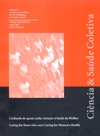0287/2007 - The obese women‘s of the slum of the country daily alimentary practices, Rio de Janeiro, Brazil.
Publicado

Sistemas de saúde ibero-americanos em perspectiva comparada
Vol. 16 N.6 -
JUNE/2011
How to
Cite
Ferreira, V.A.. The obese women‘s of the slum of the country daily alimentary practices, Rio de Janeiro, Brazil.. Cien Saude Colet [periódico na internet] (2008/Nov). [Citado em 05/12/2025]. Está disponível em: http://cienciaesaudecoletiva.com.br/en/articles/the-obese-womenlsquos-of-the-slum-of-the-country-daily-alimentary-practices-rio-de-janeiro-brazil/3090?id=3090
Latest
Articles
Execution

Sponsors








Sponsors









